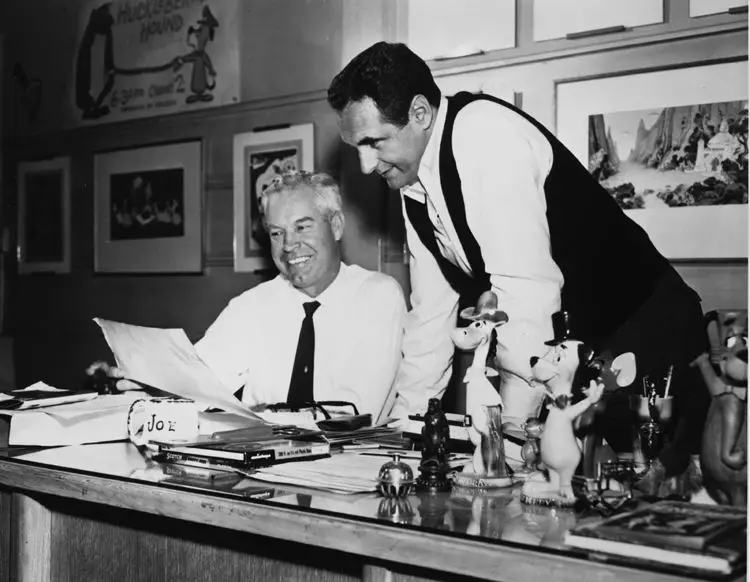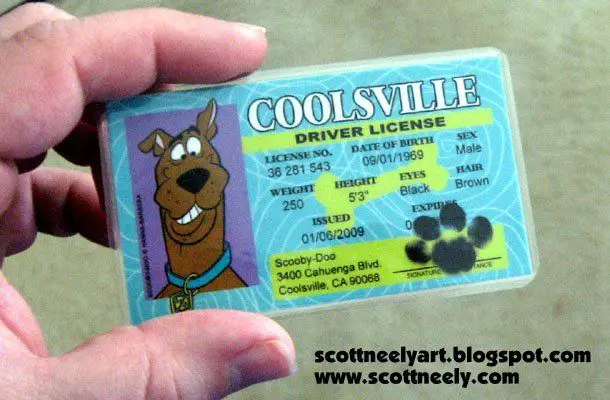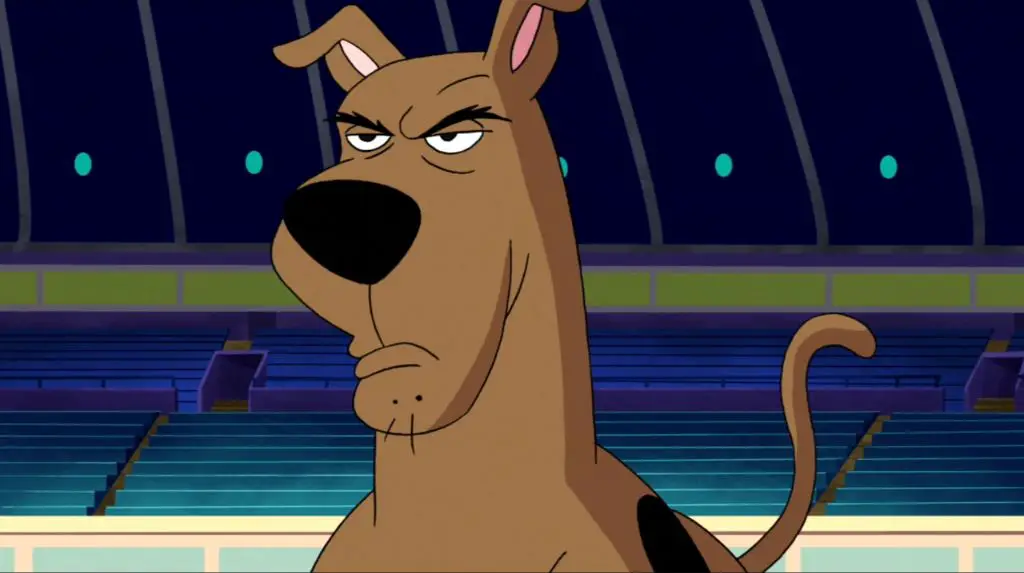Introduction
Scooby-Doo first appeared in 1969 as the star of the animated television series Scooby-Doo, Where Are You! produced by Hanna-Barbera. The show featured Scooby-Doo and his teenage friends solving mysteries involving ghosts, monsters, and supernatural creatures.
The franchise has remained popular for over 50 years, spanning multiple spin-off series, direct-to-video films, video games, comic books, and live-action feature films. Scooby-Doo has become an iconic character in American pop culture.
There has been some confusion over the ownership of Scooby-Doo over the years due to mergers and acquisitions. Hanna-Barbera originally owned the intellectual property, but this changed hands multiple times as the company was acquired by Turner Broadcasting and eventually merged into Warner Bros. (Scooby-Doo (franchise) | Scoobypedia – Fandom).
Original Owners: Hanna-Barbera
Scooby-Doo was created in 1969 by animators and cartoonists William Hanna and Joseph Barbera, the founders of Hanna-Barbera Productions. Hanna and Barbera conceived the idea for Scooby-Doo as part of their Saturday morning cartoon programming for CBS (1). The duo had previously created popular cartoons such as The Flintstones, The Jetsons, and Yogi Bear. Looking to develop a new series with a teenage demographic in mind, they settled on the concept of four teenagers and their dog solving supernatural mysteries (2).

With Hanna and Barbera at the helm, Scooby-Doo, Where Are You! premiered on CBS in September 1969. The half-hour cartoon followed amateur sleuths Fred, Daphne, Velma, Shaggy and Scooby-Doo as they traveled in their van, the Mystery Machine. Each episode involved the group stumbling upon a mystery involving ghosts, monsters or other supernatural entities. Ultimately, they would solve the case and reveal the monster to be a disguised human villain (1).
Hanna-Barbera Productions retained ownership of Scooby-Doo until the company was acquired by Turner Broadcasting System in 1991, bringing the Scooby-Doo franchise under the ownership of Turner.
(1) https://en.wikipedia.org/wiki/Scooby-Doo
(2) https://cartoonresearch.com/index.php/the-origin-of-scooby-doo/
Acquisition by Warner Bros.
In 1991, Warner Bros. acquired Hanna-Barbera Productions for $320 million, gaining the rights to the studio’s library and characters, including Scooby-Doo [1]. This acquisition was part of Warner Bros’ strategy to bolster its animation properties and production capabilities [2]. Though Hanna-Barbera operated as a subsidiary studio under Warner Bros. initially, in 1996 it was absorbed into Warner Bros. Animation. This brought the Scooby-Doo franchise fully under Warner Bros. ownership.
Time Warner Merger
In 1996, Warner Bros. merged with Time Warner in a $7.5 billion deal, creating one of the largest media companies in the world [1]. This merger brought Hanna-Barbera, by then a subsidiary of Turner Broadcasting System, under the Warner Bros. umbrella.
So when Time Warner acquired Turner later that year, Warner Bros. suddenly found itself in control of its biggest animation competitor, Hanna-Barbera. This allowed Warner Bros. to fold Hanna-Barbera into its own animation studio, giving it access to popular characters like Scooby-Doo, The Flintstones, and The Jetsons.
Current Time Warner Properties
Time Warner currently owns a number of media properties related to Scooby-Doo through its Warner Bros. division.
Some of the key Scooby-Doo properties owned by Time Warner include:
- The Scooby-Doo animated TV series, including Scooby-Doo, Where Are You!, The New Scooby-Doo Movies, The Scooby-Doo Show, and multiple later iterations produced starting in the 1980s through the present day (Wikipedia).
- Theatrical and direct-to-video Scooby-Doo films, including both animated and live action movies starting with Scooby-Doo on Zombie Island in 1998 through the most recent entries like Scoob! in 2020 (Warner Bros. Website).
- Licensing rights to produce Scooby-Doo related merchandise and products.
- Scooby-Doo video games across multiple platforms, from classic arcade games to modern mobile and console titles.
- Comic books, novels, and other Scooby-Doo literature.
- Theme park attractions like rollercoasters and dark rides.
Altogether, Scooby-Doo continues to be a major media franchise for Time Warner, spanning multiple decades and formats.
Licensing Agreements
Scooby-Doo has been extensively licensed for various merchandise and commercial promotions since its launch in 1969. The franchise’s early success in TV and films led Hanna-Barbera to license Scooby-Doo across a wide range of products such as toys, games, clothing, and more. When Warner Bros. acquired Hanna-Barbera in 2001, they gained control of the Scooby-Doo license and have continued expanding licensing deals into the modern day.

As of 2022, Warner Bros. Consumer Products oversees global licensing for Scooby-Doo [1]. Major licensing partners have included Rubie’s Costumes, Funko, Lego, Hallmark Cards, and Walmart. Rubie’s produces officially licensed Scooby-Doo Halloween costumes and accessories. Funko makes Pop! Vinyl figures and collectibles of Scooby-Doo characters. Lego first partnered with Warner Bros. in 2015 to launch Lego Scooby-Doo building sets. Hallmark sells greeting cards, ornaments, and giftware featuring the Mystery Inc. gang.
The enduring popularity of the Scooby-Doo TV series, direct-to-video films, and movies continues to drive interest in licensed toys, apparel, and other merchandise. Warner Bros. carefully manages the Scooby-Doo brand to balance nostalgia with contemporary trends in order to attract both longtime fans and new generations of consumers.
Legal Disputes
There have been several legal disputes related to the ownership and use of Scooby-Doo intellectual property over the years. In 2021, Warner Bros. lost a URS domain dispute over the domain name urs.scooby, with the panel finding that Warner Bros. does not have exclusive rights to the Scooby-Doo trademark (Source). Warner Bros. has also taken legal action against unauthorized uses of Scooby-Doo, such as suing a UK fish and chips shop called Scooby Snax over trademark infringement (Source). These disputes demonstrate that Warner Bros. actively polices and enforces its perceived Scooby-Doo rights, even as questions remain about whether Warner Bros. has exclusive trademark ownership of the Scooby-Doo name and likeness.
Fan Speculation
There has been a lot of discussion and speculation among Scooby-Doo fans regarding the franchise’s rights and any plans by Warner Bros. for future films. Many fans were disappointed when Scooby-Doo 3 was canceled after the second live-action film was released in 2004.
In online Scooby-Doo fan communities like forums and Reddit, fans have shared hopes and rumors about a reboot of the live-action films or new animated movies. There is interest among fans for Warner Bros. to develop a Scooby-Doo project that stays true to the spirit of the original animated series.
While Warner Bros. has not made any official announcements about a new Scooby-Doo movie, the active fan base continues to speculate and propose ideas. Fans cite the enduring popularity of the characters and nostalgia for the franchise as reasons why a new film or TV project could succeed.
Current Status
As of 2022, Time Warner fully owns the rights to Scooby-Doo through its subsidiary Warner Bros. Discovery. Warner Bros. acquired the franchise in 1996 after merging with Turner Broadcasting, which had previously bought the Hanna-Barbera catalog in 1991. This gave Time Warner ownership of the entire Scooby-Doo franchise, including the original 1969 TV series Scooby-Doo, Where Are You! and all subsequent shows, films, and merchandising. Time Warner continues to produce new Scooby-Doo series and films to this day through Warner Bros. Animation and Warner Bros. Pictures, with the latest entry being the animated film Scoob! in 2020. So while the specifics have changed over the decades, Scooby-Doo ultimately remains under the control of Time Warner and its different divisions.
Future Outlook
There is much speculation about what Warner Bros. may do next with Scooby-Doo. The company has announced no concrete plans, but some industry insiders predict more movies or new TV shows. According to a recent article, Scooby-Doo 3 was planned but later canceled. However, the franchise remains popular and Warner Bros. sees value in it. An IMDb article from 2020 says Warner Bros. has general plans for a “New Scooby-Doo” but no specifics were given. Fans continue to hope for a new animated series, live-action movie, or even a crossover with other Warner Bros. properties. But only time will tell what’s next for the Mystery Inc. gang.
